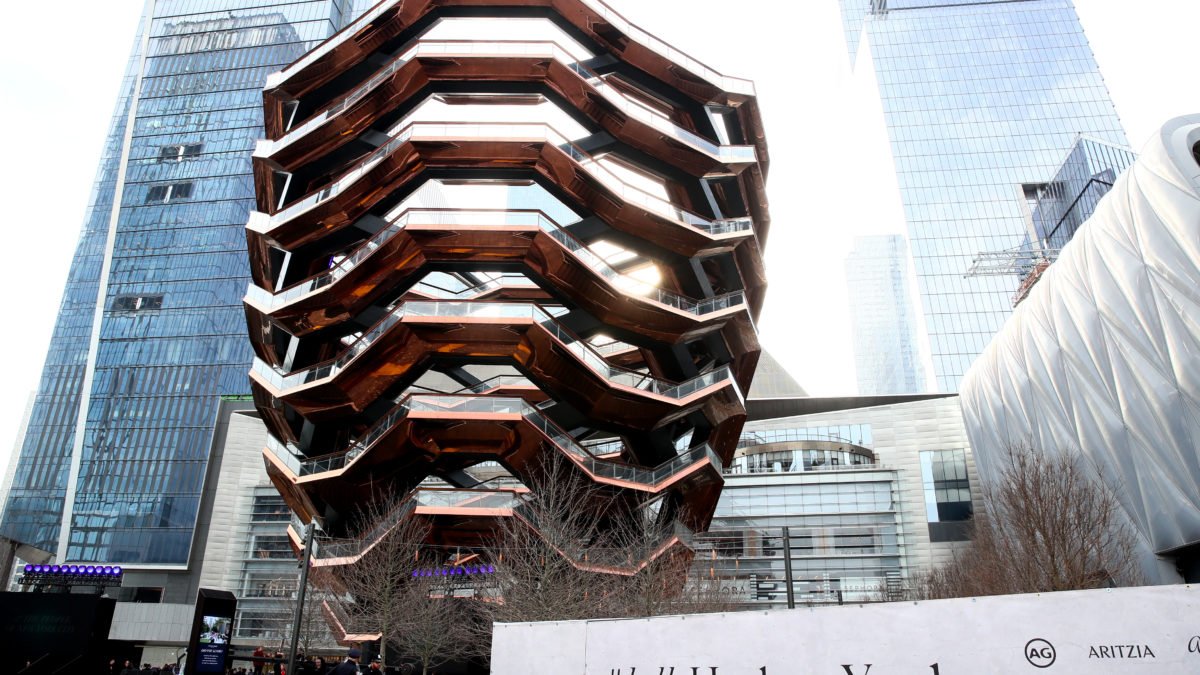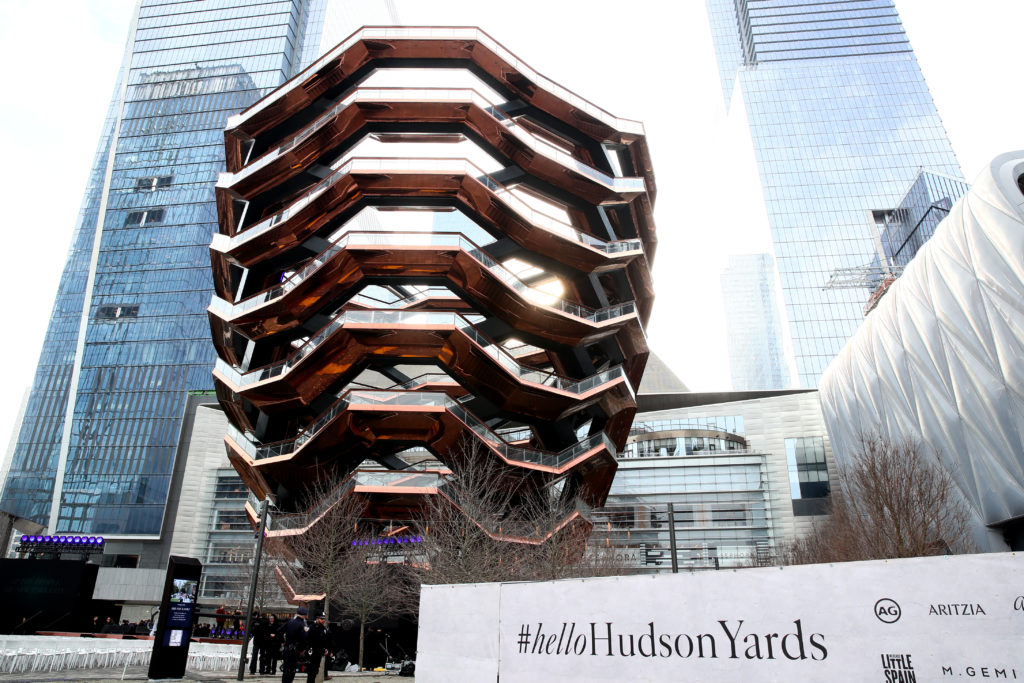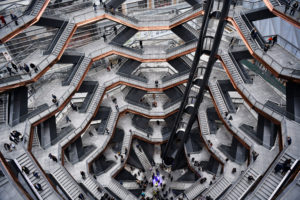Hudson Yards neighborhood opens officially; project already contributed $10B to the city’s GDP during construction

NEW YORK, NEW YORK - MARCH 15: A view of the Vessel at Hudson Yards, New York's Newest Neighborhood, Official Opening Event on March 15, 2019 in New York City. (Photo by Dia Dipasupil/Getty Images for Related)

A view of the Vessel at Hudson Yards, New York’s newest neighborhood. (Photo by Dia Dipasupil/Getty Images for Related)
by Jack Curley
The Hudson Yards neighborhood officially opened March 15 to the public. New Yorkers and visitors flocked to the Public Square and Gardens, a new five-acre public space; its centerpiece, an interactive landmark temporarily known as Vessel; and The Shops & Restaurants, a one-million-square-foot retail center featuring a collection of more than 100 diverse shops and culinary experiences. Tenants have begun moving into 55 Hudson Yards and 30 Hudson Yards, two large-scale commercial towers, and residential occupancy is underway at 15 Hudson Yards. Ten Hudson Yards opened in May of 2016. The opening of Hudson Yards, built atop the MTA’s John D. Caemmerer West Side Storage Yard, brings together for the first time the West Side and the neighboring districts of Chelsea and Hell’s Kitchen.

A view inside the Vessel at Hudson Yards. (Photo by Clint Spaulding/Getty Images for Related)
Hudson Yards developers Related Companies and Oxford Properties Group were joined by U.S. Senate Minority Leader Charles E. Schumer, Congressman Adriano Espaillat, Congressman Jerrold Nadler, and numerous elected officials. Gary LaBarbera, President of the Building and Construction Trades Council of Greater New York, and collaborators including architects, designers, contractors, engineers also attended the opening.
Gov. Cuomo said, “The development of Hudson Yards has transformed the West Side of Manhattan, creating jobs and economic opportunity for New Yorkers. With the building of a new Pennsylvania Station-Moynihan Farley complex, we are going to connect this emerging neighborhood to a world-class 21st-century transportation hub. Today marks our continued commitment toward building an even more sustainable City and region, and we are proud to be creating a stronger future for our state.”
A world-class collection of architects and designers collaborated on Hudson Yards, including: Diller Scofidio + Renfro; Elkus Manfredi Architects; Foster + Partners; Heatherwick Studio; Kohn Pedersen Fox Associates; Nelson Byrd Woltz Landscape Architects; Rockwell Group; and Skidmore, Owings & Merrill.
Hudson Yards is home to industry leaders across nearly every business sector.
- 10 Hudson Yards is home to Guardian Life Insurance Co., L’Oréal USA, Tapestry Inc., The Boston Consulting Group, SAP, VaynerMedia, Intersection and Sidewalk Labs.
- 55 Hudson Yards is home to Boies, Schiller & Flexner; Engineers Gate; HealthCor Management; Milbank LLP; Point72 Asset Management; Silver Lake; Third Point LLC; MarketAxess; and Mount Sinai Health System.
- 30 Hudson Yards is home to Kohlberg, Kravis & Roberts (KKR), WarnerMedia, Related Companies, Oxford Properties Group, Wells Fargo Securities and DNB.
- 35 Hudson Yards will be home to Equinox’s headquarters and HSS.
- 50 Hudson Yards will be home to BlackRock’s world headquarters.
A model for the 21st-century urban experience, Hudson Yards is an unprecedented mix of buildings, parks, utilities and public spaces that combine to form a connected, responsive, clean, reliable and efficient neighborhood. Planned as the first LEED-certified neighborhood, Hudson Yards is home to a first-of-it-kind microgrid and two cogeneration plants that will save 24,000 MT of CO2e greenhouse gases from being emitted annually by generating electricity and hot and chilled water for the neighborhood—more than twice as efficiently as conventional energy sources. Additionally, nearly 10 million gallons of storm water will be collected from building roofs and public plazas, then filtered and reused in mechanical and irrigation systems. The development of Hudson Yards also provides for over 1,300 new or permanently preserved affordable units onsite and in the neighborhood, 14 acres of public space and a new K-8 public school.
Hudson Yards is an economic engine for New York City, already contributing more than $10 billion to the City’s GDP during construction and serving as a significant source of revenue to the MTA. It is expected to pay the MTA $2.36 billion during construction and $66 million annually. It will also pay almost $100 million per year in tax revenue that will be available for debt service on the bonds issued for the No. 7 Subway line extension — a truly successful public/private partnership. Once fully developed, Hudson Yards will contribute nearly $19 billion annually to New York City’s Gross Domestic Product, and nearly $1 billion annually in State and City taxes. The companies and buildings at Hudson Yards will bring over 57,000 jobs to the new West Side neighborhood and Hudson Yards also estimates that, over the next six months, upwards of 600 new jobs will be filled by the developers and management team to provide essential services at the development, most of whom will be represented by SEIU 32BJ, plus thousands of additional jobs at restaurants and other campus businesses.
For more information on Hudson Yards visit HudsonYardsNewYork.com.
